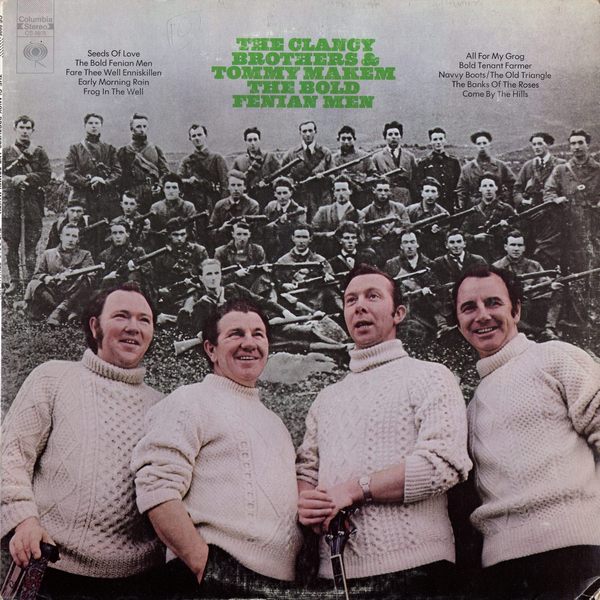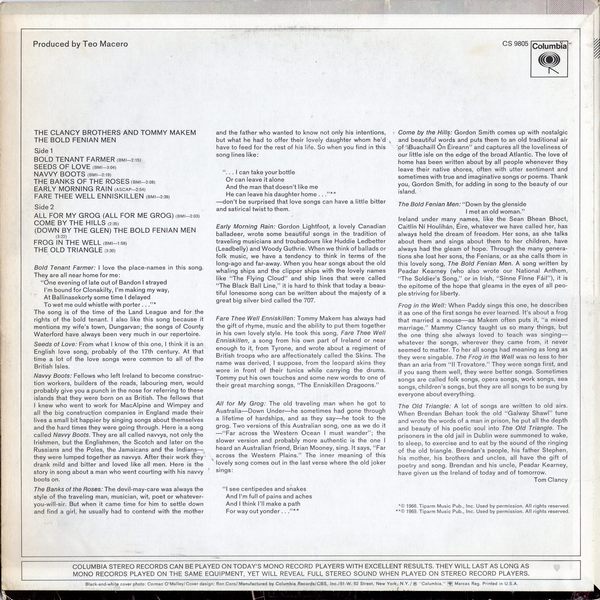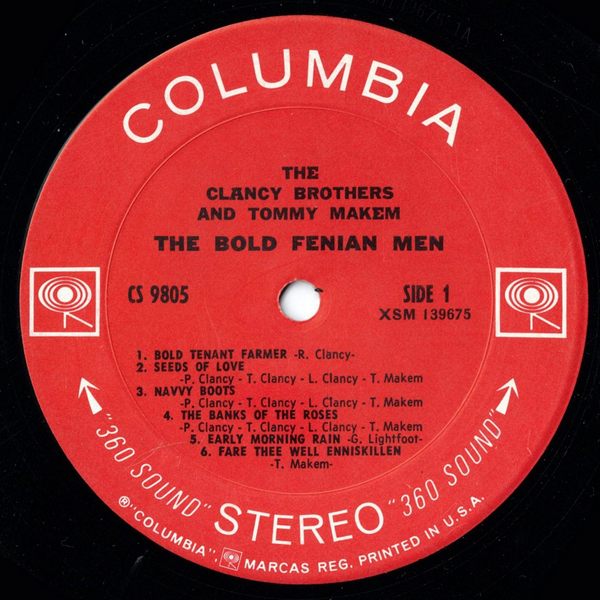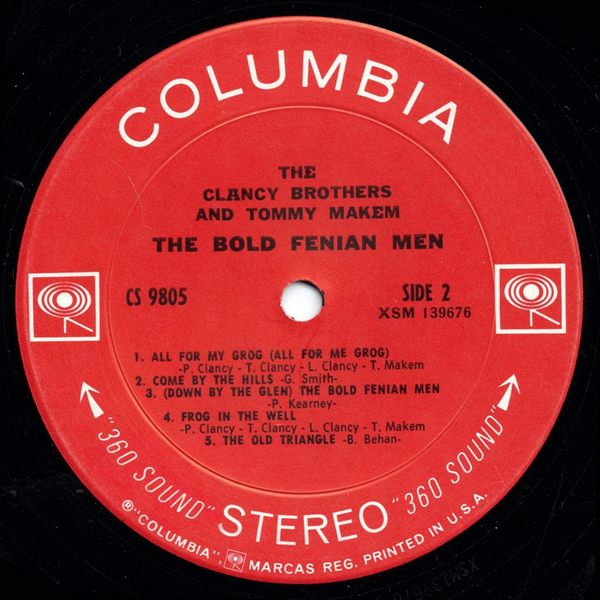

 |



|
Sleeve Notes
Bold Tenant Farmer: I love the place-names in this song. They are all near home for me:
"One evening of late out of Bandon I strayed
I'm bound for Clonakilty, I'm making my way,
At Ballinasekorty some time I delayed
To wet me ould whistle with porter … "
The song is of the time of the Land League and for the rights of the bold tenant. I also like this song because it mentions my wife's town, Dungarvan; the songs of County Waterford have always been very much in our repertoire.
Seeds of Love: From what I know of this one, I think it is an English love song, probably of the 17th century. At that time a lot of the love songs were common to all of the British Isles.
Navvy Boots: Fellows who left Ireland to become construction workers, builders of the roads, labouring men, would probably give you a punch in the nose for referring to these islands that they were born on as British. The fellows that I knew who went to work for MacAlpine and Wimpey and all the big construction companies in England made their lives a small bit happier by singing songs about themselves and the hard times they were going through. Here is a song called Navvy Boots. They are all called navvys, not only the Irishmen, but the Englishmen, the Scotch and later on the Russians and the Poles, the Jamaicans and the Indians — they were lumped together as navvys. After their work they drank mild and bitter and loved like all men. Here is the story in song about a man who went courting with his navvy boots on.
The Banks of the Roses: The devil-may-care was always the style of the traveling man, musician, wit, poet or whatever-you-will-sir. But when it came time for him to settle down and find a girl, he usually had to contend with the mother and the father who wanted to know not only his intentions, but what he had to offer their lovely daughter whom he'd have to feed for the rest of his life. So when you find in this song lines like:
" … I can take your bottle
Or can leave it alone
And the man that doesn't like me
He can leave his daughter home … "
— don't be surprised that love songs can have a little bitter and satirical twist to them.
Early Morning Rain: Gordon Lightfoot, a lovely Canadian balladeer, wrote some beautiful songs in the tradition of traveling musicians and troubadours like Huddie Ledbetter (Leadbelly) and Woody Guthrie. When we think of ballads or folk music, we have a tendency to think in terms of the long-ago and far-away. When you hear songs about the old whaling ships and the clipper ships with the lovely names like "The Flying Cloud" and ship lines that were called "The Black Ball Line," it is hard to think that today a beautiful lonesome song can be written about the majesty of a great big silver bird called the 707.
Fare Thee Well Enniskillen: Tommy Makem has always had the gift of rhyme, music and the ability to put them together in his own lovely style. He took this song, Fare Thee Well Enniskillen, a song from his own part of Ireland or near enough to it, from Tyrone, and wrote about a regiment of British troops who are affectionately called the Skins. The name was derived, I suppose, from the leopard skins they wore in front of their tunics while carrying the drums. Tommy put his own touches and some new words to one of their great marching songs, "The Enniskillen Dragoons."
All for My Grog: The old traveling man when he got to Australia — Down Under — he sometimes had gone through a lifetime of hardships, and as they say — he took to the grog. Two versions of this Australian song, one as we do it — "Far across the Western Ocean I must wander"; the slower version and probably more authentic is the one I heard an Australian friend, Brian Mooney, sing. It says. "Far across the Western Plains." The inner meaning of this lovely song comes out in the last verse where the old joker sings:
"I see centipedes and snakes
And I'm full of pains and aches
And I think I'll make a path
For way out yonder … "
Come by the Hills: Gordon Smith comes up with nostalgic and beautiful words and puts them to an old traditional air of "Buachaill On Eireann" and captures all the loveliness of our little isle on the edge of the broad Atlantic. The love of home has been written about by all people whenever they leave their native shores, often with utter sentiment and sometimes with true and imaginative songs or poems. Thank you, Gordon Smith, for adding in song to the beauty of our island.
The Bold Fenian Men:
"Down by the glenside
I met an old woman."
Ireland under many names, like the Seán Bhean Bhoct, Caitlín Ní Houlihán, Éire, whatever we have called her, has always held the dream of freedom. Her sons, as she talks about them and sings about them to her children, have always had the gleam of hope. Through the many generations she lost her sons, the Fenians, or as she calls them in this lovely song, The Bold Fenian Men. A song written by Peadar Kearney (who also wrote our National Anthem, "The Soldier's Song," or in Irish, "Sínne Fínne Fáil"), it is the epitome of the hope that gleams in the eyes of all people striving for liberty.
Frog in the Well: When Paddy sings this one, he describes it as one of the first songs he ever learned. It's about a frog that married a mouse — as Makem often puts it, "a mixed marriage." Mammy Clancy taught us so many things, but the one thing she always loved to teach was singing — whatever the songs, wherever they came from, it never seemed to matter. To her all songs had meaning as long as they were singable. The Frog in the Well was no less to her than an aria from "II Trovatore." They were songs first, and if you sang them well, they were better songs. Sometimes songs are called folk songs, opera songs, work songs, sea songs, children's songs, but they are all songs to be sung by everyone about everything.
The Old Triangle: A lot of songs are written to old airs. When Brendan Behan took the old "Galway Shawl" tune and wrote the words of a man in prison, he put all the depth and beauty of his poetic soul into The Old Triangle. The prisoners in the old jail in Dublin were summoned to wake, to sleep, to exercise and to eat by the sound of the ringing of the old triangle. Brendan's people, his father Stephen, his mother, his brothers and uncles, all have the gift of poetry and song. Brendan and his uncle, Peadar Kearney, have given us the Ireland of today and of tomorrow.
Tom Clancy